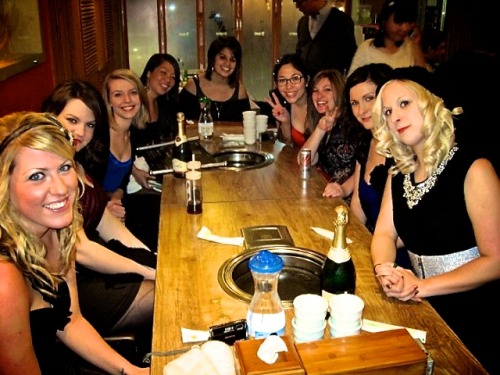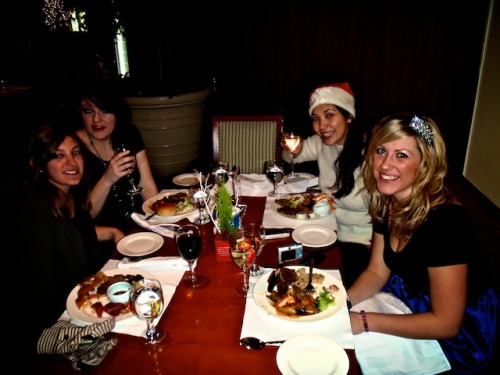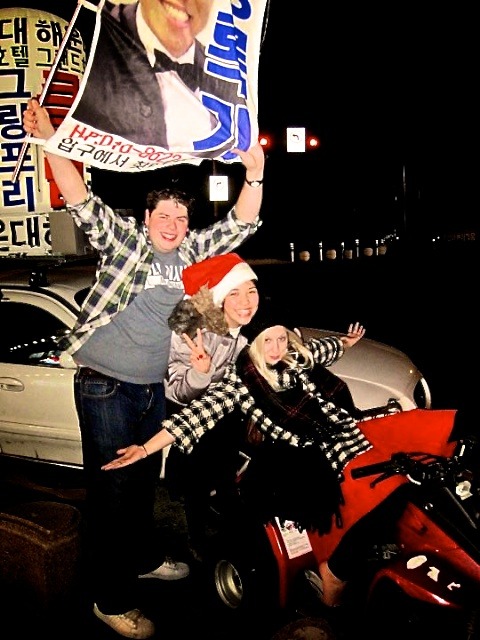Seems like everyone was really disappointed with Korean girl groups in 2010, and for good reason.
It’s kind of embarrassing then, that it was also the year that I first got into them. But still, I too was struck by how many of their members couldn’t even sing, and soon resolved to stick to the original tracks and official music videos rather than watch any live performances again.
It was with some trepidation then, that after I discovered I Don’t Care by 2NE1 (투애니원), I immediately thought to describe their voices as, well, simply beautiful, especially Park Sandara’s (박산다라). Fortunately however, they don’t seem too different on stage either, and I think I’d enjoy listening to them singing even without any accompanying music.
Here is the original music video that got me hooked:

A live performance for the sake of comparison:

Next, a video which already has English lyrics. Some are very strange and/or completely wrong though, but otherwise they’re mostly correct, and good for getting the gist:

Yeah, I don’t think a Playboy bunny costume is apt either, even for an anime version of – I think – Park Bom (박봄).
But next, a reggae mix that I hate myself, but you might like it, and I think it actually became more popular than the original in Korea:

Finally, a not bad dance remix, although I’m not really sure who the “Baek Kyoung” referred to is sorry:

Meanwhile, I’m just as surprised as you are to find myself describing the “bad girls” of K-pop as having beautiful voices. But now that I think about it, why can’t they go together?
If I did have to find a flaw with the song though, it would be that the lyrics are a little inconsistent with what stage of the relationship the couple is in exactly: as you’ll soon see, in one line the girlfriend can appear to have just split up with the boyfriend, then in the next they seem to be together but she’s thinking about it, and then in yet another they sound like they split up a long time ago!
It would be very very tempting just to have assumed that they’re in one of those stages and translated accordingly (like in the video with English lyrics above), but I don’t think the lyrics justify that, and so ended up stumbling along accordingly. But with just a bit more thought by the writers, all that unnecessary confusion could easily have been avoided.
Update – In hindsight, the final verse does indeed resolve their relationship: they’re together, but about to split up. But please forgive me though, for declining to rewrite all 2400 words of translations and explanations accordingly!^^
Hey playboy, it’s about time and your time’s up
I had to do this one for my girls you know
Sometimes you gotta act like you don’t care
That’s the only way you boys learn
Oh oh oh oh oh oh 2ne1 이야이야
Oh oh oh oh oh oh 2ne1 이야이야
니 옷깃에 묻은 립스틱들 나는 절대로 용서못해
매일 하루에 수십번 꺼져있는 핸드폰
변하지 않을것만 같아 oh oh
I absolutely can’t forgive your collar being stained with lipsticks
Every day your phone dies many times
I don’t think you’ll ever change oh oh
Line 1 of the Korean is a pretty basic, literal translation, although personally I was pretty surprised to learn that “묻다” means “stain” as well as “dig”. I’m more familiar with”얼룩지다”, easier to remember because “zebra” is “어룩말”, or literally “stain horse”.
Line 2 was more difficult though. First, because “매일” means “every day”, but then “하루” means “a day,” or “one day”, so already there’s some either unnecessary and/or nonsensical repetition (not to be confused with that about the relationship though). Not being able to figure out what the combination meant, then I decided to plump for the former, although I was tempted to put “all day long” in there instead, or “하루정일”, as given the next part then that would make sense in English at least.
That next part was “수십번”, rather confusedly “several” and/or “many times” according to my dictionary, but clearly the latter is more appropriate in the context of the song. Then, “꺼져있다” was a little confusing for a moment, as it has many meanings. And for a while, I thought that the 2 most suitable here – “fade/die out/extinguish” and “be turned off” give slightly different nuances to the song: does the boyfriend’s phone “keep on dying”, like the lyrics in one of the videos above gives, or is it turned off, presumably deliberately in order to avoid the girlfriend? But either way, note that it’s actually “꺼지다” + “있다”, meaning that the phone is left in the state of dying and/or being turned off for a long time…and I guess that the 2 meanings actually amount to pretty much the same thing in the end.
Finally, the “만” in line 3 doesn’t mean “only”, but is just used for emphasis, as we’ve seen in many previous song translations.
그저 친구라는 수많은 여자친구
날 똑같이 생각하지마 I won’t let it ride
이제 니 맘대로 해 난 미련은 버릴래
한땐 정말 사랑했는데 oh oh
All those girls you call just your friends
Don’t think of me as the same, I won’t let it ride
Now just do what you like, I want to be rid of my lingering affection for you
I really loved you once
Pretty easy, although my wife said that “그저” in line 1 meant “just”, which wasn’t one of the meanings in my dictionary, and that “한땐” in line 4 was “한때” + “는”, or “once”.
But as for the jump in the middle of the song, between sounding like they’re still together and she’s working at improving the relationship, to sounding like she, well, just doesn’t care, presumably them having split up? I’m just as stuck as you!
Update: In hindsight, it’s strange that she wants to be more than just one of his female friends? I thought that she already was, and the problem was that all of those female friends of his were actually women he’s cheated on her with?
가끔씩 술에 취해 전활 걸어 지금은 새벽 다섯시 반
넌 또 다른 여자애 이름을 불러 no no
I don’t care 그만할래 니가 어디에서 뭘 하던
이제 정말 상관 안할게 비켜줄래
이제와 울고불고 매달리지마
Frequently when you’re drunk you call me at 5:30 in the morning
And again you call me by another woman’s name no no
I don’t care, I want to end this, Wherever you are, Whatever you do
Now I won’t have anything to do with it, Get out of my way
Don’t suddenly hold on to me and start weeping
A long section, but pretty easy. Just a couple of points: first, don’t be confused by the “걸다” in “전활를 걸다” (shortened to “전활 걸어” here), as I often used to be; although by itself it does mean “hang”, “”전활를 걸다” does not mean “hang up the phone” but rather “to make a phone call”, the complete opposite.
Next, my wife says “이제와” is short for “이제와서”, which means “suddenly”. Frankly I don’t get that, so I’ll have to take her word for it, but if anybody else has an explanation then that would be appreciated!
Meanwhile, the next part is very easy, so I’ll skip an explanation:
Cause I don’t care e e e e e
I don’t care e e e e e
Cause I don’t care e e e e e
I don’t care e e e e e
Boy I don’t care
다른 여자들의 다리를 훔쳐보는
니가 너무너무 한심해
매일 빼놓는 커플링 나 몰래 한 소개팅
더 이상 못 참을 것 같아 oh oh
You steal a glance at other women’s legs
You’re so pitiful
Every day you take off your couple ring and secretly go on a blind date
I guess I can’t take it any more oh oh
넌 절대 아니라는 수많은 나의 친구
난 너 땜에 친구들까지 다 잃었지만
차라리 홀가분해 너에게 난 과분해
내 사랑이라 믿었는데 oh oh
My many friends that said you weren’t right for me
I lost all of them because of you, but
That’s actually a relief
You don’t deserve me
I believed you were my true love oh oh
And as if to make up for the easy part, that was quite difficult. True, the basic translations are easy enough, but an important part was unspoken, then yet again some sentences seem to contradict the others, then finally one way of saying something in English is said completely the opposite way in Korean!
Dealing with each in turn, line 1 is literally “you-absolutely-not-many-my friends”, but the “not” part is a relative clause incorporating the “many-my friends”. But what is the boyfriend “not”? Presumably, right for her, and presumably they said that to her too.
Next, I don’t how on Earth losing all her friends was “차라리 흘가분해”, literally “rather [a] relief” but that’s what it says: maybe because they weren’t really her friends or something.
Finally, just after that you have literally “you-to-me-unworthy”. Which sounds fine in English when put like that, but then the “me” is the subject here, as indicated by the addition of the “ㄴ”, short for “는”, and Korean is made much easier by thinking of “는” and “은” as meaning “as for” in English. So with those qualifications, now you have “you-to-as for me-unworthy”, which would be best re-ordered in English to “as for me-to-you-unworthy”. But rest assured, it is definitely still he that is unworthy of her in the Korean nonetheless…
There are only 2 new lines in the next section, and they’re pretty easy, so again I’ll skip an explanation. Yeah, I ‘m beginning to notice a pattern too:
오늘도 바쁘다고 말하는 너 혹시나 전화해봤지만
역시 뒤에선 여자 웃음소리가 들려 oh no
I don’t care 그만할래 니가 어디에서 뭘 하던
이제 정말 상관 안할게 비켜줄래
이제와 울고불고 매달리지마
Cause I don’t care e e e e e
I don’t care e e e e e
You said you were busy today too, but by chance I got a hold of you and
In the background I heard a woman’s laugh oh no
I don’t care, I want to end this, Wherever you are, Whatever you do
Now I won’t have anything to do with it, Get out of my way
Don’t suddenly hold on to me and start weeping
Cause I don’t care e e e e e
I don’t care e e e e e
난 너 땜에 울며 지새던 밤을 기억해 boy
더 후회할 걸 생각하면 맘이 시원해 boy
날 놓치긴 아깝고 갖기엔 시시하잖니
있을때 잘하지 너 왜 이제와 매달리니
I remember the night I cried until dawn because of you boy
I think I will regret it more if we stay together, now I feel relieved boy
When I’m gone I’m valuable, but when we were together I was nothing
You should have done better back then, why are you are hanging on to me now?
As per the pattern, you’d expect this verse to be difficult. And indeed, although line 1 was fine, frankly I can’t make head or tail of line 2 especially, and invite alternative translations.
Literally, it is “more-regret [will]-think [if]-my heart & mind-relief”. But regret what? Not splitting up? And if you think? Arrgh!
As you can see, I came up with something for line 2 that certainly sounds okay, but it’s largely guesswork really. Line 3 and 4 at least though, were simple enough, with my wife telling me that the “있을때 잘하지” in the latter (when you have [them], you have to do well) is often used to express regret about relationships.
속아준 거짓말만 해도 수백번
오늘 이후로 난 남자 울리는 bad girl
이젠 눈물 한방울 없이 널 비웃어
사랑이란 게임 속 loser
무릎꿇고 잘못을 뉘우쳐
아님 눈 앞에서 당장 꺼져
Now clap your hands to this
I also know about the hundreds of lies you’ve tricked me with
As of today, I’m a bad girl that makes men cry
Now, without so much as a tear I laugh at you
Love is a loser in this game
Get on your knees and repent
Or get out of my sight
With great relief, the pattern was maintained with this last verse(!), and so it was quite easy, only the “속아준” in line 1 throwing me off a little. Normally, saying a verb + “주다” means to do the verb for the speaker, i.e. a request, but how do you be tricked” for someone (note that “속다” means “be tricked”, wheres “속이다” means ” to trick”)? I gave up, but the native speaker in the other room told me that it basically means that, she, the singer, knows or knew she was being tricked.
I’ll take my wife’s word for it. Other pearls of wisdom from her include “오늘 이후로” in line 2 meaning “as of today”, and “잘못을 뉘우쳐” in line 5 as a whole meaning “repent”, my dictionary just giving the 2nd word.
And not before time, there’s just the chorus after that:
I don’t care 그만할래 니가 어디에서 뭘 하던
이제 정말 상관 안할게 비켜줄래
이제와 울고불고 매달리지마
you know I don`t care e e e e e
I don`t care e e e e e
you know I just don`t care e e e e e
I don`t care e e e e e
Boy I don`t care
And on that note, I hope you enjoyed it, and as always I’m open to and grateful for any help and suggestions for anything you think I made a mistake with, and/or – in this case – simply couldn’t understand.
Before I wrap this up though, one thing I was very surprised about in it was that no matter how bad her boyfriend has been, and no matter how much of a “bad girl” the singer supposedly is now, that she would still take him back if he did indeed repent. Granted, confession and expression of remorse carries considerably more weight in Korean (and Japanese) society than in Western ones. But still, perhaps 2ne1 is not quite as “bad” as I’ve been led to believe all these years then (or only is by restrictive Korean standards for female performers), and it’ll be very interesting to see just how provocative (or not) their lyrics in their other songs are now.
But first, I’ll be translating Like The First Time (처음처럼), by T-ara (티아라):


Filed under:
Girl Groups,
Korean Music,
Song Lyrics & Translations Tagged:
2NE1,
I Don't Care,
투애니원 







 Via Jose Areta – and I still don’t know what “the “penalty factor” is – South Korea and Taiwan traded statistical accolades in the Chinese market. But, it’s interesting how South Korea did it.
Via Jose Areta – and I still don’t know what “the “penalty factor” is – South Korea and Taiwan traded statistical accolades in the Chinese market. But, it’s interesting how South Korea did it.


 I feel for
I feel for 




 Here’s another moment when I almost felt I had paid money for a Master’s degree for a reason. The topic of my final paper in the methodology course I completed a month ago turns up in a blog post. “
Here’s another moment when I almost felt I had paid money for a Master’s degree for a reason. The topic of my final paper in the methodology course I completed a month ago turns up in a blog post. “


 RSS Feed
RSS Feed I didn’t think a debate I’d encountered in my last International Relations methodology course would wind up appearing so quickly in the mainstream press. But here’s
I didn’t think a debate I’d encountered in my last International Relations methodology course would wind up appearing so quickly in the mainstream press. But here’s 
























Recent comments